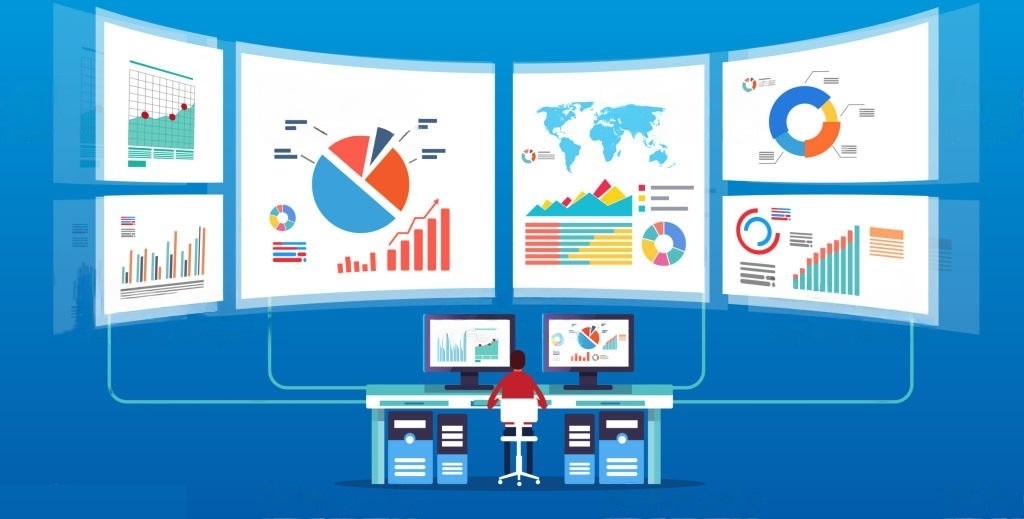Hey there!
Have you ever wondered how some companies seem to always be ahead of the curve, making better decisions and outperforming their competition?
Well, I’ve got a little secret for you: it’s all about harnessing the power of Business Intelligence (BI).
In today’s data-driven world, businesses generate a staggering 2.5 quintillion bytes of data every single day!
With all this information at our fingertips, it’s crucial for companies to find ways to turn these numbers into actionable insights.
And that’s where BI comes in.
Imagine you’re the owner of a popular ice cream shop 
With BI, you can analyze data from sales, social media, and customer feedback to make informed decisions that boost your business. Sounds exciting, right?
Now that I’ve piqued your curiosity, let’s dive in and explore the fascinating world of Business Intelligence together. We’ll uncover its importance, applications, and how it can be a game-changer for businesses of all sizes.
So, grab your favorite ice cream flavor, and let’s get started!
Table of Contents
- What is Business Intelligence (BI)?
- History of Business Intelligence (BI)?
- Importance of Business Intelligence
- Core Components of Business Intelligence
- Applications of Business Intelligence
- Summary
What is Business Intelligence (BI)? 
Business Intelligence is the process of collecting, analyzing, and presenting data to help businesses make informed decisions.
Think of it like your personal assistant 

History of Business Intelligence (BI)?
BI has actually been around for quite some time. Believe it or not, it dates back to the 1960s, when computers first started to help companies manage their data.
Fast forward to the ’90s, and we saw the rise of data warehouses and more advanced data analysis tools. Today, BI has evolved into a powerful tool that helps businesses stay ahead of the competition in our fast-paced, digital world.
To sum it up, Business Intelligence is like a superhero 
Stay tuned, as we dive deeper into the world of BI and discover its importance, applications, and how it can help businesses like yours soar to new heights.
Importance of Business Intelligence
Alright, now that we’ve covered the basics of BI, let’s dive into why it’s so important in today’s business world. 
Enhanced decision-making 
- Access to real-time data: Imagine having a crystal ball
that shows you exactly what’s happening in your business right now. That’s what BI offers! By giving you access to real-time data, you can make decisions based on up-to-the-minute information. For example, Uber uses real-time data to match drivers with riders, ensuring a seamless experience for everyone.
- Data-driven insights: Ever heard the saying “knowledge is power”?
Well, BI turns raw data into valuable insights, helping you make informed decisions. Take Spotify, for example. By analyzing user data, the platform can recommend personalized playlists, keeping users hooked and coming back for more.
Increased operational efficiency 
- Streamlined processes: BI helps identify areas where you can improve operations, making your business more efficient. Imagine a restaurant using BI to analyze wait times and optimize its seating plan. Faster service means happier customers!
- Identification of bottlenecks: BI can pinpoint problem areas in your business, allowing you to address them before they become major issues. Let’s say an online store
uses BI to discover that slow shipping is causing customers to abandon their carts. By improving delivery times, they can boost sales and keep customers happy.
Improved customer experience 
- Personalized offerings: By understanding customer behavior, businesses can tailor their offerings to better meet their needs. Amazon is a prime example (pun intended!
). The online giant uses BI to recommend products based on users’ browsing and purchase histories, making shopping a breeze.
- Understanding customer behavior: BI helps businesses get to know their customers better. For instance, Netflix uses BI to analyze viewing habits, enabling them to produce hit shows like “Stranger Things” that keep subscribers hooked.
Competitive advantage 
- Identifying market trends: BI can help you spot emerging trends before your competitors do, giving you a leg up in the race for success. For example, Apple used BI to recognize the rising demand for smartphones, leading to the creation of the iPhone.
And we all know how that turned out!
- Adapting to industry changes: BI helps businesses stay agile and adapt to changes in the market. Kodak, once a leader in the photography industry, failed to adapt to the digital revolution, while companies like Canon and Nikon embraced it and thrived.
Financial benefits 
- Cost savings: By identifying inefficiencies, BI can help you cut costs and save money. For example, a manufacturing company might use BI to optimize its production line, reducing waste and lowering expenses.
- Revenue growth: BI can also help drive revenue by identifying new opportunities and maximizing sales. Imagine a retail store using BI to analyze customer data and discovering that a specific demographic loves a particular product. They could then target their marketing efforts to reach more of these customers, boosting sales.
Core Components of Business Intelligence
Let’s break down its core components. Think of these as the building blocks 
Data collection and integration 
This is where it all begins! Collecting data from various sources, like sales, social media, and customer feedback, is crucial for BI. Once the data is collected, it’s integrated into a single system to create a complete and accurate picture of your business. For example, a hotel chain might collect data from online reviews, bookings, and guest feedback to better understand their clientele.
Data warehousing and storage 
A data warehouse is like a giant library 
Data analysis 
Now comes the fun part! Data analysis involves using tools and techniques to uncover patterns, trends, and insights from your data. For instance, a clothing retailer might analyze sales data to identify the most popular items and sizes, helping them optimize their inventory.
Data visualization and reporting 
Ever heard the saying “a picture is worth a thousand words”? Well, that’s the idea behind data visualization. It’s all about presenting data in a visually appealing and easy-to-understand format, like charts, graphs, and maps. 
User access and collaboration 
Last but not least, BI is all about making data accessible to the right people at the right time. This includes creating user-friendly dashboards and reports that can be shared and collaborated on. Let’s say a marketing team wants to track the performance of a new ad campaign. By providing real-time access to relevant data, they can adjust their strategy on the fly and maximize results.
So, there you have it! These core components of Business Data Intelligence Insights work together like a well-oiled machine 
Applications of Business Intelligence
Sales and marketing 
- Sales forecasting: BI helps businesses predict future sales based on historical data and market trends. For example, Coca-Cola uses BI to forecast demand, ensuring they produce just the right amount of their delicious beverages.
- Customer segmentation: By analyzing customer data, businesses can divide their audience into smaller groups with similar characteristics, making marketing efforts more targeted and effective. Remember how Spotify creates personalized playlists? That’s customer segmentation in action!
Finance and accounting 
- Budgeting and financial planning: BI allows companies to analyze financial data to make smarter budgeting decisions. For instance, a restaurant chain might use BI to identify the most profitable locations and allocate resources accordingly.
- Fraud detection: Financial institutions use BI to identify suspicious transactions and prevent fraud.
- For example, credit card companies analyze transaction patterns to detect unusual activity, potentially saving customers from unauthorized charges.
- For example, credit card companies analyze transaction patterns to detect unusual activity, potentially saving customers from unauthorized charges.
Supply chain and logistics 
- Inventory optimization: Businesses can use BI to optimize inventory levels, reducing stockouts and minimizing holding costs. Amazon, for example, uses BI to ensure they have the right products in stock to meet customer demand.
- Demand forecasting: BI helps companies predict future demand, allowing them to better plan their supply chain operations. Zara, the fast-fashion giant, uses demand forecasting to quickly respond to changing fashion trends and keep their inventory fresh.
Human resources 
- Workforce planning: BI can help HR departments analyze employee data to make informed decisions about hiring, training, and retaining talent.
- For example, a tech company might use BI to identify skill gaps and invest in training programs to keep their team up-to-date.
- For example, a tech company might use BI to identify skill gaps and invest in training programs to keep their team up-to-date.
- Employee performance analysis: By analyzing performance data, companies can identify top performers, discover areas for improvement, and ensure a fair and transparent evaluation process. This helps create a motivated and productive workforce.
Manufacturing and production 
- Production scheduling: BI can optimize production schedules, reducing downtime and improving efficiency. Imagine a car manufacturer using BI to analyze production data and identify the optimal sequence of assembling parts.
- Quality control: Companies can use BI to monitor product quality and identify potential issues before they become costly problems.
- For example, a pharmaceutical company might use BI to ensure consistent production quality, protecting patient safety and maintaining regulatory compliance.
- For example, a pharmaceutical company might use BI to ensure consistent production quality, protecting patient safety and maintaining regulatory compliance.
Summary
Business Intelligence is a powerful tool that can transform the way businesses operate and make decisions. From collecting and analyzing data to visualizing insights and fostering collaboration, BI enables organizations to uncover hidden opportunities, optimize processes, and stay ahead of the competition.
With its diverse applications across industries like sales, marketing, finance, supply chain, human resources, and manufacturing, it’s clear that BI has the potential to revolutionize any business, regardless of its size or sector.
So, whether you’re a budding entrepreneur or a seasoned professional, embracing the power of Business Intelligence can help you unlock your full potential and drive your business to new heights.
Remember, data is the new currency, and those who know how to harness it will thrive in today’s fast-paced and ever-changing world.
Now that you’ve got a solid understanding of BI, it’s time to put this knowledge into practice and become a data-driven superstar!
So, what are you waiting for? Dive in and explore the exciting world of Business Intelligence – the sky’s the limit!
Thank you for reading our blog, we hope you found the information provided helpful and informative. We invite you to follow and share this blog with your colleagues and friends if you found it useful.
Share your thoughts and ideas in the comments below. To get in touch with us, please send an email to dataspaceconsulting@gmail.com or contactus@dataspacein.com.
You can also visit our website – DataspaceAI



























